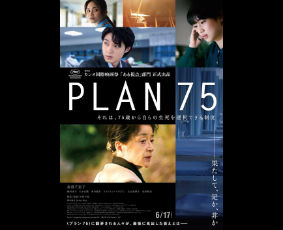PLAN 75, Japan/Philippines/France 2022. Directed by Hayakawa Chie, written by Jason Gray & Hayakawa Chie.
Bambi Theater 2, Row 2, Seat 5. Original version with subs.
(This post originally appeared in abbreviated form at my Instagram account betweendrafts.)
A movie that’s not easy to digest. After a dramatic—and rather violent—opening that serves as both backstory and catalyst for the “voluntary euthanasia” setting (think Soylent Green, not Logan’s Run), everything develops very slowly. No dramatic ups or downs; the camera’s either fixed or moves very sparsely; music is nearly absent except in a handful of scenes, and even then only briefly and sparse as well.
What makes the movie both difficult and fascinating is that its outrageous premise has become, as seen through the eyes of three protagonists, a thoroughly mundane and widely accepted part of Japanese society. One protagonist is outside, one inside the Plan 75 organizational system, each matched with a complementary character from the inside and outside, respectively, and the third—very poignantly a Filipina nurse—moves from the outside to the inside of the system without fully becoming part of it.
Some elements are, of course, reminiscent of recent history, especially Germany’s. But in PLAN 75, the system is never violently coercive, nor is it efficient. It works, but it fails the people both inside and outside in ever so slightly exasperating ways, courtesy of both callousness and the mismanagement of an overstretched administration. Black humor is also involved, like, e.g., a happy announcement that a permanent address is no longer required to take part in the program as a reaction to old people losing their homes to demolition and development.
Interestingly, there was a consensus among elderly women interviewed by the director that they wouldn’t necessarily use Plan 75 but want it as an option: “They saw it as something that would make them feel more secure.”
Finally, the movie doesn’t end on a specific “note,” neither a hopeless nor a hopeful one, nor anything in between. The storylines of both the inside protagonist and the outside protagonist are left hanging in mid-air after they make the movie’s first unpredictable decisions. The unpredictability of these spur-of-the-moment decisions, in the end, is what neither the system nor the movie has a solution for.
Which is perhaps one of the things the movie is about.
Addendum
At one particular scene, a character looks directly into the camera, which poses dramaturgic questions. But its import is counterbalanced (or undermined) shortly thereafter: once again, a character looks directly into the camera, but it’s immediately revealed as a shot-reverse shot, only that the camera, highly unusual, stands in a straight line between this and another character. Hard to fathom what’s going on. Possibly, even probably, the first instance was a similar unusual shot-reverse shot, only its second beat was cut in post. But it still wouldn’t explain why these two curious shots had been lined up in this peculiar way in the first place.
Then, when I skimmed Western reviews, I encountered some surprising misunderstandings with regard to the final scenes of the inside protagonist who took care of his uncle. Two in particular—that the Plan 75 administration were selling corpses “for profit” to a company who runs industrial incinerators, and the other that the inside protagonist came back to save his uncle’s life. Both resonate with Western dystopian and humanist sensibilities, respectively, and both are complete nonsense. The incineration problem had been addressed earlier in the movie, to the effect that the Plan 75 cremation facilities hadn’t been able to keep up with demand because of mismanagement, and that a solution had to be found to prevent the cancellation of numerous scheduled assisted suicides; and the inside protagonist, who had found out about this stopgap measure, came back for his uncle not to save him but to provide him with a decent cremation. So no sudden cyberpunkish or humanistic finale reversals, sorry about that!
As for the German subtitle set the theater’s copy of the movie came with, it was followable but often careless, and it also skipped—with the exception of the introductory scene—most of the background media like TV news or announcements. With some care, these subtitles could have been a lot better.
________________
All Movie Reviews
If you have something valuable to add or some interesting point to discuss, I’ll be looking forward to meeting you at Mastodon!

